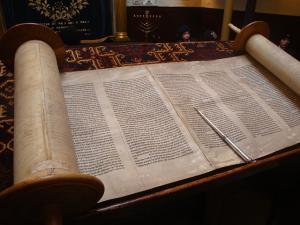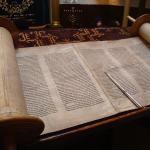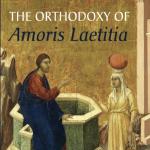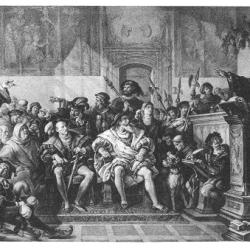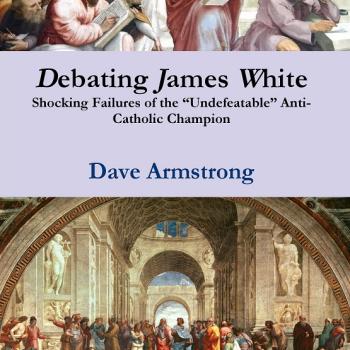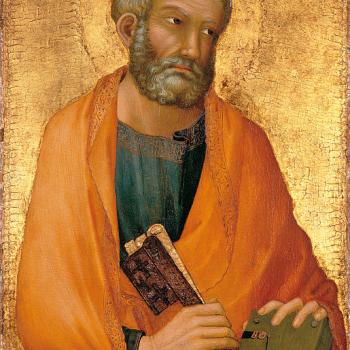The Barely Protestant YouTube channel is run by an Anglican priest, Fr. James, who apparently wishes to refrain from publicly using his last name. The description of the site reads: “An Anglo-Catholic who is on YouTube to help explain the historic (non-Papal) Catholic Faith within the Anglican Tradition.”
*****
This is a reply to his video, “Response to Fr. Mitch Pacwa’s Critique of Sola Scriptura” (4-6-21). As always, I will be looking to see if he can produce biblical proof of sola Scriptura, as he logically must, for the doctrine to escape being self-defeating. His words will be in blue.
The Protestant reformers did not believe, by sola Scriptura, that it’s the Bible alone and you don’t have anything else. [3:28-34]
I totally agree. Fr. James’ task, however, is to present his notion of the authentic definition of sola Scriptura, and where it is found in the Bible (i.e., why he believes it: based on the Bible or extra-biblical reasons). Fr. Mitch Pacwa, whom Fr. James is analyzing and citing, does indeed offer an erroneous and not properly qualified and nuanced “radically Bible alone” definition. This is unfortunate. All sides need to accurately understand the beliefs of others, and to not misrepresent their doctrines.
Historically, what is sola Scriptura? I’m going to read from Article 6 of the Thirty-Nine Articles. The 39 Articles is part of our confessional standards as Anglicans. [he then cites it]
VI. OF THE SUFFICIENCY OF THE HOLY SCRIPTURES FOR SALVATION
Holy Scripture containeth all things necessary to salvation: so that whatsoever is not read therein, nor may be proved thereby, is not to be required of any man, that it should be believed as an article of the Faith, or be thought requisite or necessary to salvation. [5:19-6:01]
Note that this also proves my contention: that sola Scriptura must be proven by Scripture (according to this Anglican Confession), because it states “whatsoever is not read therein, nor may be proved thereby, is not to be required of any man, that it should be believed as an article of the Faith.” Therefore, if sola Scriptura can’t be thus proven, Fr. James’ Anglican tradition informs him, it ought not be believed, let alone required for all, and let alone raised to the level of the rule of faith and one of the two “pillars” of the Protestant Reformation (along with sola fide: faith alone).
Fr. James (at least so far, and I am answering as I listen) doesn’t include the aspect of “infallibility” in his definition, which is about as wrong as what Fr. Pacwa offered. It’s part of the equation of the definition and essence of sola Scriptura, as seen from many recent defenders of that doctrine:
Reformed Baptist apologist James White (already mentioned by Fr. James in his video) defines sola Scriptura as I have myself defined it for 31 years as a Catholic:
The doctrine of sola scriptura, simply stated, is that the Scriptures alone are sufficient to function as the regula fidei, the infallible rule of faith for the Church. (The Roman Catholic Controversy, Minneapolis: Bethany House Publishers, 1996, 59; the original was all italics)
Reformed Protestant Keith A. Mathison concurs:
Scripture . . . is the only inspired and inherently infallible norm, and therefore Scripture is the only final authoritative norm. (The Shape of Sola Scriptura, Moscow, Idaho: Canon Press, 2001, 260)
So does the late Protestant apologist Norman Geisler:
What Protestants mean by sola scriptura is that the Bible alone is the infallible written authority for faith and morals. (Roman Catholics and Evangelicals: Agreements and Differences, Grand Rapids, Michigan: Baker Books, 1995, 178; co-author, Ralph E. Mackenzie)
Lutheran pastor Jordan Cooper agrees as well:
Sola Scriptura . . . recognizes that there are many authorities, but Scripture is the sole infallible authority, so Scripture has preference over all other authorities we might have. (“An Explanation of Sola Scriptura“, 3-11-19)
As does Baptist pastor Gavin Ortlund:
Sola Scriptura has always been maintained as the view that the Bible is the only infallible rule for theology. (“Sola Scriptura DEFENDED”, 12-15-20).
The above is the standard definition of sola Scriptura. Fr. James has (at least so far) neglected to include the crucial variable of infallibility in it: which denies infallibility to anything else. No one is arguing that Scripture isn’t unique, the sole inspired revelation, the written Word of God or that it is materially sufficient. The relevant question in this debate is: “is Scripture the only infallible authority in Christian life and theology?” And secondly: where is such a doctrine taught in the Bible? If it’s not in the Bible, it is clearly false, because it’s a view that has to do fundamentally with the Bible. If it comes from outside the Bible, it would be self-contradictory and self-defeating.
Infallibility is a lesser characteristic than inspiration, which Scripture alone possesses. Catholics contend that there are carefully defined instances of the exercise of infallible authority other than Scripture: from the Church, sacred apostolic tradition, ecumenical councils, and popes. In other words, when sola Scriptura is defined in this way, as it usually is, it precludes the infallibility of these other entities. Therefore, if Scripture can be shown to teach the infallibility of anything other than Scripture, sola Scriptura is then shown to be a false doctrine.
If Fr. James objects that these guys aren’t Anglicans, I’m happy to have that discussion as well, having written a 310-page book replying to two of the most famous historic Anglican defenders of sola Scriptura: Pillars of Sola Scriptura: Replies to Whitaker, Goode, & Biblical “Proofs” for “Bible Alone” (2012). The definition of William Goode (1801-1868) is the same as I have said (expressed a bit differently, but amounting to the same thing):
The foundation upon which this truth rests is, as we have seen, briefly this; That as God is the only infallible Judge of controversies in religion, and as his voice can be recognised with certainty only in the Holy Scriptures, those Scriptures are consequently our only infallible Judge of controversies on earth. (The Divine Rule of Faith and Practice, 3 volumes, 1853, vol. 2, p. 126; see the citation online)
At the 17-minute mark, Fr. James keeps rightly objecting (over and over) to Fr. Pacwa’s false definition and straw man. That’s fine (I agree). For my purposes, I want to see why he believes in sola Scriptura, in its classic, proper “Reformation” definition, and it seems to me that the rationale (in the nature of the case) must be in Scripture itself. Will he ever do that in this video? I sure hope so.
I didn’t find any reference to a biblical defense of sola Scriptura in the entire video. If it occurred, perhaps Fr. James would be kind enough to direct me to it, so I can address his arguments. But I have two biblical arguments for an infallible Church, which are enough to refute sola Scriptura themselves.
In the Jerusalem Council, described in Acts 15, apostles (including Paul, Peter, and James) and elders got together to resolve a controversy over the place and function of circumcision, which foods were clean, and in a broader sense, how much Mosaic Law would apply to Christians. Here’s what it decided:
Acts 15:28-29 (RSV) For it has seemed good to the Holy Spirit and to us to lay upon you no greater burden than these necessary things: [29] that you abstain from what has been sacrificed to idols and from blood and from what is strangled and from unchastity. If you keep yourselves from these, you will do well. Farewell.
Here is the authority that this letter had, as seen in how Paul viewed it:
Acts 16:4 As they went on their way through the cities, they delivered to them for observance the decisions which had been reached by the apostles and elders who were at Jerusalem.
This is the universal and authoritative (and in this case, infallible) Church. A decision reached at Jerusalem was regarded as binding and in effect, “infallible” and was to be observed not just locally, but by Christians all through Asia Minor (Turkey), where Paul was preaching. This is essentially the equivalent of an ecumenical council.
1 Timothy 3:15 . . . the household of God, which is the church of the living God, the pillar and bulwark of the truth.
This may not seem compelling at first: just seven words at the end. But I believe that if we analyze it more deeply and think through it, that it provides a rock-solid argument for the infallibility of the Church. Here’s how I myself did that in my book, 100 Biblical Arguments Against Sola Scriptura (pp. 104-107, #82):
Pillars and foundations support things and prevent them from collapsing. To be a “bulwark” of the truth, means to be a “safety net” against truth turning into falsity. If the Church could err, it could not be what Scripture says it is. God’s truth would be the house built on a foundation of sand in Jesus’ parable. For this passage of Scripture to be true, the Church could not err — it must be infallible. A similar passage may cast further light on 1 Timothy 3:15:
Ephesians 2:19-21 . . . you are fellow citizens with the saints and members of the household of God, [20] built upon the foundation of the apostles and prophets, Christ Jesus himself being the cornerstone, [21] in whom the whole structure is joined together and grows into a holy temple in the Lord;
1 Timothy 3:15 defines “household of God” as “the church of the living God.” Therefore, we know that Ephesians 2:19-21 is also referring to the Church, even though that word is not present. Here the Church’s own “foundation” is “the apostles and prophets, Christ Jesus himself being the cornerstone.” The foundation of the Church itself is Jesus and apostles and prophets.
Prophets spoke “in the name of the Lord” (1 Chron 21:19; 2 Chron 33:18; Jer 26:9), and commonly introduced their utterances with “thus says the Lord” (Is 10:24; Jer 4:3; 26:4; Ezek 13:8; Amos 3:11-12; and many more). They spoke the “word of the Lord” (Is 1:10; 38:4; Jer 1:2; 13:3, 8; 14:1; Ezek 13:1-2; Hos 1:1; Joel 1:1; Jon 1:1; Mic 1:1, et cetera). These communications cannot contain any untruths insofar as they truly originate from God, with the prophet serving as a spokesman or intermediary of God (Jer 2:2; 26:8; Ezek 11:5; Zech 1:6; and many more). Likewise, apostles proclaimed truth unmixed with error (1 Cor 2:7-13; 1 Tim 2:7; 2 Tim 1:11-14; 2 Pet 1:12-21).
Does this foundation have any faults or cracks? Since Jesus is the cornerstone, he can hardly be a faulty foundation. Neither can the apostles or prophets err when teaching the inspired gospel message or proclaiming God’s word. In the way that apostles and prophets are infallible, so is the Church set up by our Lord Jesus Christ. We ourselves (all Christians) are incorporated into the Church (following the metaphor), on top of the foundation.
1 Peter 2:4-9 Come to him, to that living stone, rejected by men but in God’s sight chosen and precious; [5] and like living stones be yourselves built into a spiritual house, to be a holy priesthood, to offer spiritual sacrifices acceptable to God through Jesus Christ. [6] For it stands in scripture: “Behold, I am laying in Zion a stone, a cornerstone chosen and precious, and he who believes in him will not be put to shame.” [7] To you therefore who believe, he is precious, but for those who do not believe, “The very stone which the builders rejected has become the head of the corner,” [8] and “A stone that will make men stumble, a rock that will make them fall”; for they stumble because they disobey the word, as they were destined to do. [9] But you are a chosen race, a royal priesthood, a holy nation, God’s own people, that you may declare the wonderful deeds of him who called you out of darkness into his marvelous light. (cf. Isa 28:16)
Jesus is without fault or untruth, and he is the cornerstone of the Church. The Church is also more than once even identified with Jesus himself, by being called his “Body” (Acts 9:5 cf. with 22:4 and 26:11; 1 Cor 12:27; Eph 1:22-23; 4:12; 5:23, 30; Col 1:24). That the Church is so intimately connected with Jesus, who is infallible, is itself a strong argument that the Church is also infallible and without error.
Therefore, the Church is built on the foundation of Jesus (perfect in all knowledge), and the prophets and apostles (who spoke infallible truth, often recorded in inspired, infallible Scripture). Moreover, it is the very “Body of Christ.” It stands to reason that the Church herself is infallible, by the same token. In the Bible, nowhere is truth presented as anything less than pure truth, unmixed with error. That was certainly how Paul conceived his own “tradition” that he received and passed down.
Knowing what truth is, how can its own foundation or pillar be something less than total truth (since truth itself contains no falsehoods, untruths, lies, or errors)? It cannot. It is impossible. It is a straightforward matter of logic and plain observation. A stream cannot rise above its source. What is built upon a foundation cannot be greater than the foundation. If it were, the whole structure would collapse.
If an elephant stood on the shoulders of a man as its foundation, that foundation would collapse. The base of a skyscraper has to hold the weight above it. The foundations of a suspension bridge over a river have to be strong enough to support that bridge.
Therefore, we must conclude that if the Church is the foundation of truth, the Church must be infallible, since truth is infallible, and the foundation cannot be lesser than that which is built upon it. And since there is another infallible authority apart from Scripture, sola scriptura must be false.
***
Practical Matters: Perhaps some of my 4,000+ free online articles (the most comprehensive “one-stop” Catholic apologetics site) or fifty books have helped you (by God’s grace) to decide to become Catholic or to return to the Church, or better understand some doctrines and why we believe them.
Or you may believe my work is worthy to support for the purpose of apologetics and evangelism in general. If so, please seriously consider a much-needed financial contribution. I’m always in need of more funds: especially monthly support. “The laborer is worthy of his wages” (1 Tim 5:18, NKJV). 1 December 2021 was my 20th anniversary as a full-time Catholic apologist, and February 2022 marked the 25th anniversary of my blog.
PayPal donations are the easiest: just send to my email address: apologistdave@gmail.com. You’ll see the term “Catholic Used Book Service”, which is my old side-business. To learn about the different methods of contributing, including 100% tax deduction, etc., see my page: About Catholic Apologist Dave Armstrong / Donation Information. Thanks a million from the bottom of my heart!
***
Photo credit: Lawrie Cate (3-9-09) [Wikimedia Commons / Creative Commons Attribution 2.0 Generic license]
***
Summary: Anglo-Catholic Fr. James, of the “Barely Protestant” YouTube channel critiques a Catholic criticism of sola Scriptura but unfortunately provides no biblical proofs at all.


